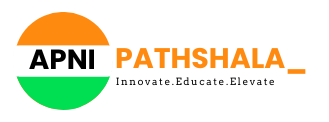From Dreams to Action: Vivek’s Inspiring Journey Through Renukiran’s Learning Pod | Apni Pathshala
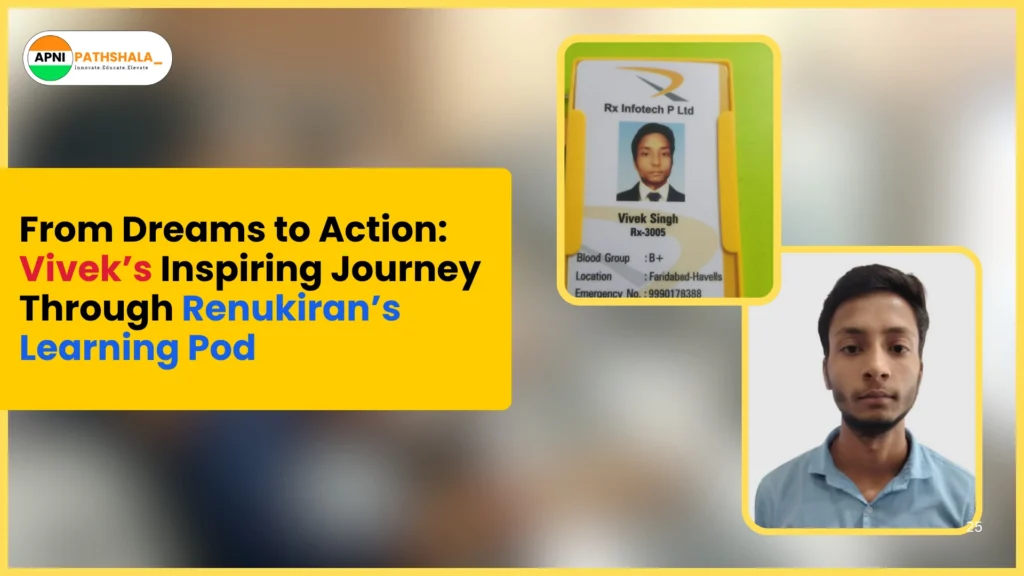
When you grow up in a place where dreams often take a backseat to daily survival, it’s easy to lose hope. But some stories remind us that with the right support, even the easiest beginnings can lead to powerful change. This is the story of Vivek Singh, a young man from Tilpat, Haryana, who dared to dream and found the tools to chase that dream through a learning pod supported by Renukiran Welfare Foundation and ApniPathshala. A Life Built on Hard Work Vivek’s family came to Tilpat from Aligarh, Uttar Pradesh, years ago. His father, in search of work, began labouring in Delhi, lifting iron at a local company. The job is tough and hours long but it puts food on the table. At home, Vivek’s mother takes care of the household. His eldest brother delivers packages for Flipkart. His other brother is pursuing law. Vivek himself is doing a BA (Bachelor of Arts) from a nearby college. Money is tight. Time is tighter. But what Vivek had, like many young people in India, was a quiet, persistent dream. “I want to become a police officer,” he says. “I admire their strength, the way they protect people.” But between college, part-time jobs, and the pressure to contribute to his family, that dream felt distant. A Ray of Hope: The Learning Pod That Changed Everything One day, a friend told Vivek about the Renukiran Welfare Foundation learning pod, a safe community space offering practical training, skill-building, and emotional support to young people like him. Curious, Vivek enrolled. Through Apni Pathshala’s support, the learning pod gave him more than just knowledge, it gave him confidence. Here, he learned: These weren’t just ‘extra skills’, they were bridges to opportunity. From Classroom to Career With new confidence and the right preparation, Vivek applied for a part-time job at RX Infotech Pvt. Ltd. He cracked the interview. Today, he juggles his first-year BA classes with a part-time role, earning, learning, and growing every single day. “I never thought I’d manage both college and a job,” Vivek says, smiling. “But now, I do.” It’s not easy. He travels. He studies. He works. He helps at home. And still, he dreams of the police uniform, of service, of dignity. His journey is proof that when grassroots education meets a willing learner, change isn’t just possible, it’s unstoppable. More Than a Student: A Role Model in the Making Vivek’s story isn’t just about one boy, it’s about what happens when community-driven education meets a determined heart. Learning pods like the one at Renukiran Welfare Foundation are redefining what education means for young Indians. They go beyond textbooks. They offer real-life skills, emotional support, and a space where kids feel seen, heard, and hopeful. Vivek’s success has inspired others in his locality. Younger kids look up to him. Families see what’s possible. He’s not just chasing his dreams anymore, he’s becoming a reason others start dreaming too. Why Stories Like Vivek’s Matter In a country where millions of children face barriers to basic opportunities, learning pods are game-changers. They bring education closer to the community, to the streets, to the homes where dreams are often silenced. Vivek’s journey is not about privilege. It’s about possibility. It’s about what happens when someone believes in you—and gives you tools to believe in yourself. About Apni Pathshala- And How You Can Be a Part of It At ApniPathshala, we believe that real change begins in the heart of a community. Through learning pods like the one at Renukiran Welfare Foundation, we support children and youth who are full of dreams but lack the means. We don’t just teach—we listen, we guide, and we grow with them. Vivek’s story is just one of many. There are thousands more waiting for someone to believe in them. You can be that someone. Join hands with ApniPathshala and help us build a future where every child gets a fair chance to learn, grow, and rise.Contact ApniPathshala to get involved today.
How a 14-Year-Old Built an E-Bike from Scratch Without Formal Training?
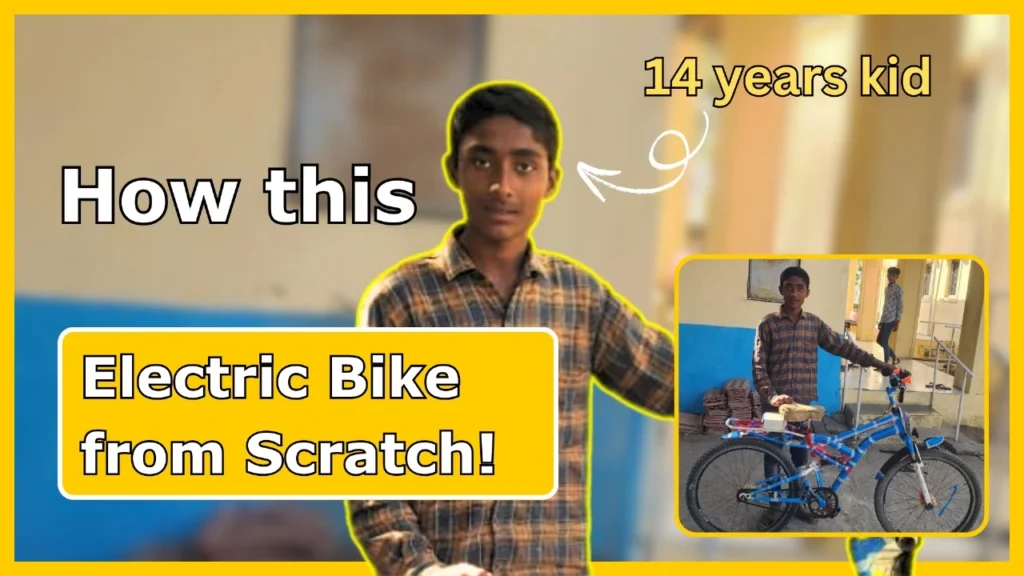
What does it take to build an e-bike? Money? Resources? A fancy engineering degree? What if I told you that a 14-year-old boy from a small village in Kutch built one with no formal training, no expensive tools, and barely any resources? Meet Rizwan, an 8th-grade student from Bhadreshwar, Kutch, whose passion for innovation turned his simple bicycle into a self-made e-bike. A boy who had every reason to say, “I can’t,” but instead chose to ask, “How can I?” This is the story of skill development in Kutch, where young minds turn curiosity into innovation. This is Rizwan’s story. A Childhood of Struggles, But a Mind That Never Stopped Dreaming Rizwan’s life was never easy. His single mother, who worked as a domestic help, spent her days washing dishes in different houses in Bhadreshwar to make ends meet. Money was tight. There were days when affording a meal was difficult—owning an electric bike? That was a dream too big to even think about. But Rizwan was not an ordinary child. While most kids were busy playing, he was busy fixing things. His mind was always searching, always hungry to learn. But where would he find the knowledge? Who would teach him? Well, YouTube! When most kids are all about cartoons, anime and games, Rizwan used youtube to learn about building things like e-bikes, drones, etc. After learning about motors and technical stuff individually, now was the time to study digital skills in a collaborative environment and shine. That’s when an opportunity came as a blessing in disguise-Yusuf Mehrally Centre! A Life-Changing Opportunity: Discovering the Power of Community Learning Rizwan’s friend, Parth, who had won the Best Student award a year ago, introduced him to the Yusuf Meherally Centre—a place that provided free computer education and digital skills to students like him in a community learning environment Excited, Rizwan enrolled. Thanks to Apni Pathshala’s sponsorship of personal computers, Rizwan got access to something he had never touched before—a computer. At first, he explored Microsoft Office, becoming an expert in Excel and Word. But his heart was in something bigger—he wanted to create something with his own hands. That’s when he decided: “I will build my own electric bicycle.” The Birth of an Idea Most kids dream of owning a fancy cycle. Rizwan? He wanted to build one. His inspiration came from a simple thought: “Why should I pedal every day when I can make my cycle run on its own?” He had seen electric vehicles in cities, but in his village, they were rare. If he could build one, it could change the way people commuted. The idea was exciting. But how do you build something without money, training, or proper tools? The Struggle: Failures and Unstoppable Determination Coming from a household with financial issues. Living in a village with few resources. Surrounded by people with little technical expertise. Of course, building an e-bike wasn’t easy. Problem #1: No Guidance There was no one in his village who could teach him about electric bikes. Even at the community learning center, they taught about advanced “digital skills” and not mechanical engineering stuff. So, what did he do? YouTube became his teacher. He watched video after video, studying how motors work, how batteries store energy, and how wiring is done. His self-taught journey highlights the importance of accessible learning and structured skill development in Kutch to nurture young talent. Problem #2: No Money for Parts Motors, batteries, controllers—these were really expensive. But Rizwan didn’t let money stop him. He started collecting old electronic parts, picking up whatever he could find. Slowly, he gathered: Problem #3: Trial and Error The first time he assembled everything, it didn’t work. He rechecked the wiring—still nothing. He tested the battery—dead. For weeks, he kept failing. Again and again. Any other kid would have given up. But not Rizwan.“I knew it would work. I just had to find the mistake.” And then, one fine evening—it happened! The wheels finally moved on their own. Rizwan had done it. “Whose E-Bike Is This?” One morning, as the coordinator of the Yusuf Meherally Centre walked into the centre, he saw an electric bicycle parked outside. Curious, he asked, “Whose e-bike is this?” “Sir, it’s mine,” Rizwan answered. At first, nobody believed him. I mean, I don’t blame them- How could an 8th grader build an e-bike? But when he explained the entire process–how he sourced the parts, assembled them, and fixed every issue on his own, everyone was left speechless. Rizwan had not just built an e-bike, he had built a future for himself. What’s Next? Rizwan isn’t stopping here. They are not wrong when they say that you just need to taste success once, you’ll get addicted. Now that he has built his own e-bike, his mind is racing with bigger ideas: And his ultimate goal? To become an engineer and build solutions that help people. “I don’t just want to build things for myself. I want to create things that can make life easier for others.” May it be working on building drones or making sensors that help prevent accidents, this is just the beginning of his journey. His success story showcases how early exposure to skill development in Kutch can transform dreams into reality. Why Does Rizwan’s Story Matter? Rizwan’s story is not just about building an e-bike. It’s about proving that talent is everywhere—but opportunity is not. At Apni Pathshala and Yusuf Meherally Centre, we believe in giving every child a chance to dream, learn, and create in a community learning setup. We believe in promoting skill development to every part of the country- From Kashmir to Kanyakumari. From Assam to Kutch. And if Rizwan’s journey has inspired you, here’s how you can help more kids like him: Contact the team at ApniPathshala! Because when we invest in a child’s future, we don’t just change one life, we change generations. And who knows? The next big innovator might just be a kid waiting for one
Apni Pathshala 2.0: Innovate. Educate. Elevate
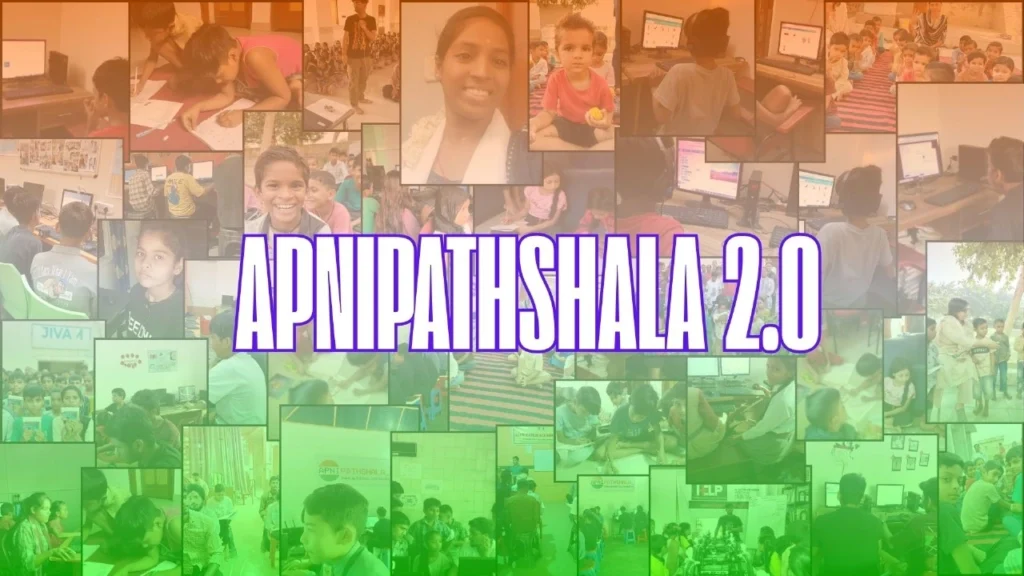
What if we told you there’s a way to bring education to even the most remote communities? A way to make those kids learn coding who don’t even know how to start a computer? A way to help people build skills and become self-reliant? Sounds amazing, right? Well, that’s exactly what Apni Pathshala 2.0 is all about! If you’ve heard of the original Apni Pathshala, you already know it has done amazing work in connecting underprivileged communities with education. But Apni Pathshala 2.0 takes things to the next level. It’s bigger, more organized, and, most importantly, ready to create a lasting impact. Want to know what makes this initiative even more special? What’s Apni Pathshala 2.0 All About? In simple terms, Apni Pathshala 2.0 helps small learning centers, called learning PODs, become powerful hubs of knowledge and digital skills. Over 15 months, these PODs get all the tools and guidance they need to teach students, build websites, and eventually become self-sustainable. Why “2.0”? What’s New? When we first started, Apni Pathshala focused on teaching and sharing updates from PODs. But we realized something important: these learning PODs needed a structured plan to grow and make lasting impact. So, with Apni Pathshala 2.0, we’ve added clear phases, practical goals, and proper timelines. By the end of each phase, we’ll have a proper understanding of each pod’s development and progress. This isn’t just about education anymore, it’s about creating lasting change. Each POD gets personalized support, a step-by-step roadmap, and the tools to make real progress. What’s the Purpose, Goals & Vision? Purpose. First things first, the purpose of Apni Pathshala 2.0 is to create self-sufficient learning centers, known as learning PODs, across India. These are spaces where people can learn digital skills, develop practical abilities, and access education to improve their lives. Goals To achieve this purpose, we’ve set some clear, actionable goals: These goals aren’t just boxes to tick, they’re the foundation of a movement to bring learning and growth to places that need it the most. Vision Now, let’s talk about the dream we’re chasing. We are chasing a future where every community in India has access to a self-sustaining learning center. These centers bridge the gap between those who have access to technology and education and those who don’t. Our vision is to: The Journey: 4 Exciting Phases Phase 0: Getting Started Timeline: Flexible (You decide when you’re ready!)This is where it all begins. We’ll start laying the foundation for your POD’s success. Here’s what happens: By the end of Phase 0, your POD will be equipped and confident to kickstart Phase 1! Phase 1: Building Strong Foundations Timeline: 3 monthsThis phase is all about setting a strong base for your students and POD activities. By the end of Phase 1, your students will be certified in digital skills, and your POD will have a solid online presence! Phase 2: Making Websites Timeline: 3 monthsNow it’s time to take things to the next level. Here the students will learn to create their very own websites! By the end of Phase 2, your students will have real-world skills, and your POD will be quite interactive with all these activities! Phase 3: Independence and Sustainability Timeline: Open-endedThis phase is all about making sure your pod becomes self sustainable and can work with/without you. So that you can watch your POD work and grow independently. By the end of Phase 3, your POD will be fully self-reliant, with a strong community presence and sustainable growth plan! Why Does This Matter? Not everyone has access to good education or technology. Many communities are left behind because they lack resources. Apni Pathshala 2.0 changes this by: The best part? More than learning, it’s about creating opportunities, building independence, and giving people hope. What Happens After Apni Pathshala 2.0? Once Apni Pathshala 2.0 completes its mission of guiding 50 learning PODs through structured phases, don’t you think that journey ends just like that. Over the first six months, PODs move through Phases 0, 1, and 2, with constant support from Apni Pathshala coordinators. The goal is to make sure every POD has the foundation and tools to grow. When a POD reaches Phase 3, it steps into independence. This means they’re ready to operate on their own, managing resources, teaching skills, and staying sustainable without needing external help. While these PODs are moving towards self-sufficiency, the team behind Apni Pathshala is already focused on setting up new PODs. These new learning hubs will go through the initial support stages and eventually join Apni Pathshala 3.0, continuing the cycle of education and empowerment. The process ensures a balance i.e. existing PODs would work independently, while new PODs are nurtured and onboarded. It’s a sustainable system that allows continuous growth and a broader reach. Apni Pathshala 3.0 will take things further, scaling up the network of PODs, mentoring new ones, and creating lasting change. With each new step, the vision of empowering communities through education becomes more real. How Can You Help? This journey isn’t something we can do alone. Whether you’re a teacher, a community leader, or someone who just wants to make a difference, you can play a role. Spread the word, volunteer, or simply support the mission. Together, we can bring the power of education to every corner of the country. Yes, Apni Pathshala 2.0 is about education but more than that it’s about changing lives. This isn’t just a program, it’s a movement. And you can be a part of it.So, what do you say? Let’s Innovate. Educate. Elevate. together!
How Swami Vivekananda Medical Mission and Apni Pathshala Empower Tribal Communities?
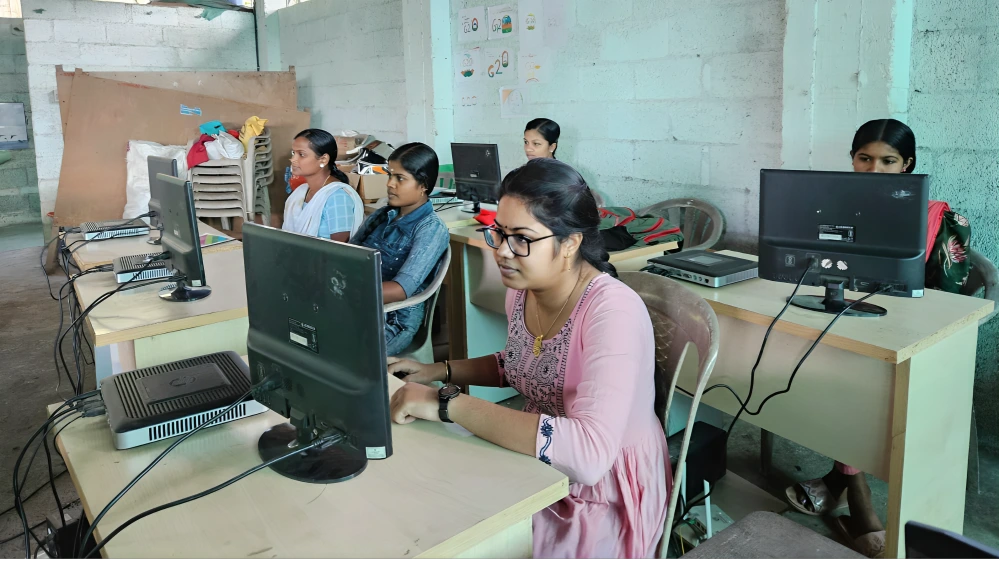
Amidst the quiet hills of Attappady, Kerala, there’s a place that holds a special kind of magic—a place where kindness and hope come together to change lives. This place is the Swami Vivekananda Medical Mission, a foundation that began with a simple yet powerful purpose: to serve those who needed it the most. What started as a small hospital in 2002, offering care to the tribal population, has grown into a fully working community centre focusing on providing education and livelihood. Today, the mission is so much more than just a hospital, it’s a home for hope, a center for learning, and a space where dreams are nurtured. The Heart of the Mission: A Foundation of Care At its core, the Swami Vivekananda Medical Mission has always been about healthcare. The need for affordable medical care in Attappady was urgent—tribal families often couldn’t afford even basic treatments. The healthcare efforts here are nothing less than extraordinary. Dr. Narayan, a doctor who has been with the mission from the start, treats tribal patients for just 10 rupees. Yes, you read that right—10 rupees. It’s not about the money for him. It’s about making sure that no one, no matter how poor or disadvantaged, is left without care. But for Dr. Narayan, it’s not about the money. As per him, health is a basic right and no one should be denied it because they can’t afford it. This value has saved countless lives, offering not just medical care but dignity and respect to those who need it most. Beyond Healthcare By 2009, the SVMM’s work had grown far beyond its original scope. It became an NGO community center, addressing deeper issues like education, women’s empowerment, and even the eradication of social evils like alcoholism. One of the mission’s key focuses today is education. Not just traditional schooling but skill-based learning that raises individuals with tools for self-reliance. Varsha, one of the mission’s dedicated team members, has been active in driving these efforts. Learning and Growing Together Education has become a lifeline for many in this community. But here, education isn’t just about books or degrees, it’s about giving people the tools they need to change their lives. Varsha, a dedicated team member at the mission, shares her experience with a spark in her eyes. “We focus a lot on skill development,” she says. One of their programs is a basic computer education course that runs for a month. Students learn MS Office and other basic skills that open up new opportunities for them. Currently, 35 to 40 students, mostly aged 18 to 35, are enrolled in these programs. During summer vacations, even younger children join in, eager to learn and explore. What’s even more inspiring is that Scheduled Caste (SC) and Scheduled Tribe (ST) students can take these courses for free. But the mission doesn’t stop at education. It also focuses on livelihood programs, helping people find ways to earn a living and support their families. “It’s not just about skills,” Varsha explains. “It’s about showing them that they can dream bigger and achieve more.” What makes the Swami Vivekananda Medical Mission truly unique is its connection with the tribal community. Varsha shares how deeply she’s been touched by their hospitality and respect. “The bond with the tribal population here is so special,” she says. “They don’t have much, but they give so much—kindness, gratitude, and love.” Overcoming Challenges Of course, the journey hasn’t been easy. Attappady is a remote and underdeveloped area, and there are systemic barriers that the mission has constantly faced and most importantly, overcame. One of the most heartbreaking challenges, Varsha says, is the limited opportunities for women. “Many women here aren’t allowed to study after marriage,” she shares. “It’s a barrier that holds them back from reaching their potential.” Despite these hurdles, the mission refuses to give up. Each obstacle is a reminder of why their work matters so much. They know that change doesn’t happen overnight, but they also know that every small step forward counts. Apni Pathshala: A Helping Hand One of the most beautiful parts of this story is the partnership between the Swami Vivekananda Medical Mission and Apni Pathshala. At a time when the mission was struggling with funding, Apni Pathshala stepped in and donated 10 computers. “It was a turning point for us,” Varsha recalls with gratitude. “With their support, we were able to expand our programs and give students here the chance to learn skills that can truly change their lives.” This partnership is about belief. Apni Pathshala believed in the mission and its vision, and that belief has made all the difference. Dreaming of a Brighter Tomorrow The Swami Vivekananda Medical Mission not only works for today, but is building a better future. Varsha talks about the mission’s vision with so much passion. “We want people to step out of their shell,” she says. “So many people here don’t even know what’s possible beyond their community. Our job is to make them aware. To show them that there’s a whole world of opportunities waiting for them.” The mission dreams of introducing vocational courses and reaching even more people. But for them, success isn’t measured in numbers. “If even one person benefits from what we do, it’s a win,” Varsha says, her voice filled with emotion. A Message That Stays With You As we reached the end of our conversation, Varsha shared a message that felt like it came straight from the heart. “If you’re privileged enough to help someone,” she said, “just do it. Don’t overthink it. Even the smallest act of kindness can change someone’s life.” The Swami Vivekananda Medical Mission isn’t just a place, it’s a feeling. It’s the hope that no matter how tough life gets, there’s always someone willing to help. It’s the belief that every person deserves a chance to dream, learn, and grow. With dedicated people like Dr. Narayan and Varsha, and the relentless support of partners like Apni Pathshala, the mission continues
Transforming Rural Education: The Journey of Apni Pathshala

Unlocking potential through peer learning: where students thrive and grow together.
